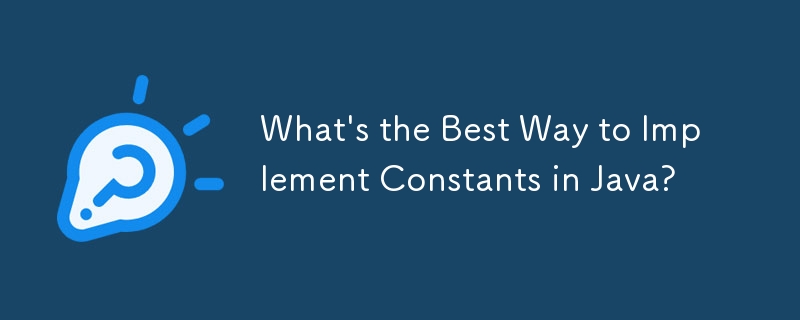What's the Best Way to Implement Constants in Java?
Dec 08, 2024 pm 02:36 PM
The Art of Implementing Constants in Java: A Comprehensive Guide
For novice Java developers, understanding the optimal approach to implementing constants can be a daunting task. This article addresses a frequently asked question: "What is the best way to implement constants in Java?"
The Standard Approach: Static Final Fields
As exemplified in the provided code snippet, the standard approach to defining constants in Java is by declaring them as static and final fields within a class. This is accomplished using the syntax:
public static final int MAX_SECONDS = 25;
This approach provides several benefits:
- Immutability: Once assigned, constants cannot be modified, ensuring their integrity.
- Class-Scoped Access: Constants are accessible throughout the class where they are defined.
Avoid Encapsulating Constants in Classes
While it may seem intuitive to group constants within a dedicated class or interface, this practice is generally advised against. By keeping constants in the classes where they are used, you maintain a clear association between the constants and their respective functionality.
Exceptions: Interface Constants
One exception to this rule applies to constants declared in interfaces. Interfaces are implicitly static and final, making it appropriate to define constants within them:
public interface Constants {
int MAX_SECONDS = 25;
}Mutability Considerations
It's important to note that final variables can still be mutable. However, this mutability only affects the value within the variable, not the reference itself. For example, consider the following code:
public static final Point ORIGIN = new Point(0,0);
public static void main(String[] args){
ORIGIN.x = 3;
}Despite being declared final, ORIGIN is a mutable Point object whose x coordinate can be modified.
Conclusion
Implementing constants as static final fields within classes is the recommended approach in Java. This technique provides immutability, class-scoped access, and a straightforward implementation that minimizes the risk of confusion.
The above is the detailed content of What's the Best Way to Implement Constants in Java?. For more information, please follow other related articles on the PHP Chinese website!

Hot Article

Hot tools Tags

Hot Article

Hot Article Tags

Notepad++7.3.1
Easy-to-use and free code editor

SublimeText3 Chinese version
Chinese version, very easy to use

Zend Studio 13.0.1
Powerful PHP integrated development environment

Dreamweaver CS6
Visual web development tools

SublimeText3 Mac version
God-level code editing software (SublimeText3)

Hot Topics
 Top 4 JavaScript Frameworks in 2025: React, Angular, Vue, Svelte
Mar 07, 2025 pm 06:09 PM
Top 4 JavaScript Frameworks in 2025: React, Angular, Vue, Svelte
Mar 07, 2025 pm 06:09 PM
Top 4 JavaScript Frameworks in 2025: React, Angular, Vue, Svelte
 How does Java's classloading mechanism work, including different classloaders and their delegation models?
Mar 17, 2025 pm 05:35 PM
How does Java's classloading mechanism work, including different classloaders and their delegation models?
Mar 17, 2025 pm 05:35 PM
How does Java's classloading mechanism work, including different classloaders and their delegation models?
 How can I use JPA (Java Persistence API) for object-relational mapping with advanced features like caching and lazy loading?
Mar 17, 2025 pm 05:43 PM
How can I use JPA (Java Persistence API) for object-relational mapping with advanced features like caching and lazy loading?
Mar 17, 2025 pm 05:43 PM
How can I use JPA (Java Persistence API) for object-relational mapping with advanced features like caching and lazy loading?
 Iceberg: The Future of Data Lake Tables
Mar 07, 2025 pm 06:31 PM
Iceberg: The Future of Data Lake Tables
Mar 07, 2025 pm 06:31 PM
Iceberg: The Future of Data Lake Tables
 How do I use Maven or Gradle for advanced Java project management, build automation, and dependency resolution?
Mar 17, 2025 pm 05:46 PM
How do I use Maven or Gradle for advanced Java project management, build automation, and dependency resolution?
Mar 17, 2025 pm 05:46 PM
How do I use Maven or Gradle for advanced Java project management, build automation, and dependency resolution?
 Spring Boot SnakeYAML 2.0 CVE-2022-1471 Issue Fixed
Mar 07, 2025 pm 05:52 PM
Spring Boot SnakeYAML 2.0 CVE-2022-1471 Issue Fixed
Mar 07, 2025 pm 05:52 PM
Spring Boot SnakeYAML 2.0 CVE-2022-1471 Issue Fixed
 Node.js 20: Key Performance Boosts and New Features
Mar 07, 2025 pm 06:12 PM
Node.js 20: Key Performance Boosts and New Features
Mar 07, 2025 pm 06:12 PM
Node.js 20: Key Performance Boosts and New Features
 How do I implement multi-level caching in Java applications using libraries like Caffeine or Guava Cache?
Mar 17, 2025 pm 05:44 PM
How do I implement multi-level caching in Java applications using libraries like Caffeine or Guava Cache?
Mar 17, 2025 pm 05:44 PM
How do I implement multi-level caching in Java applications using libraries like Caffeine or Guava Cache?







